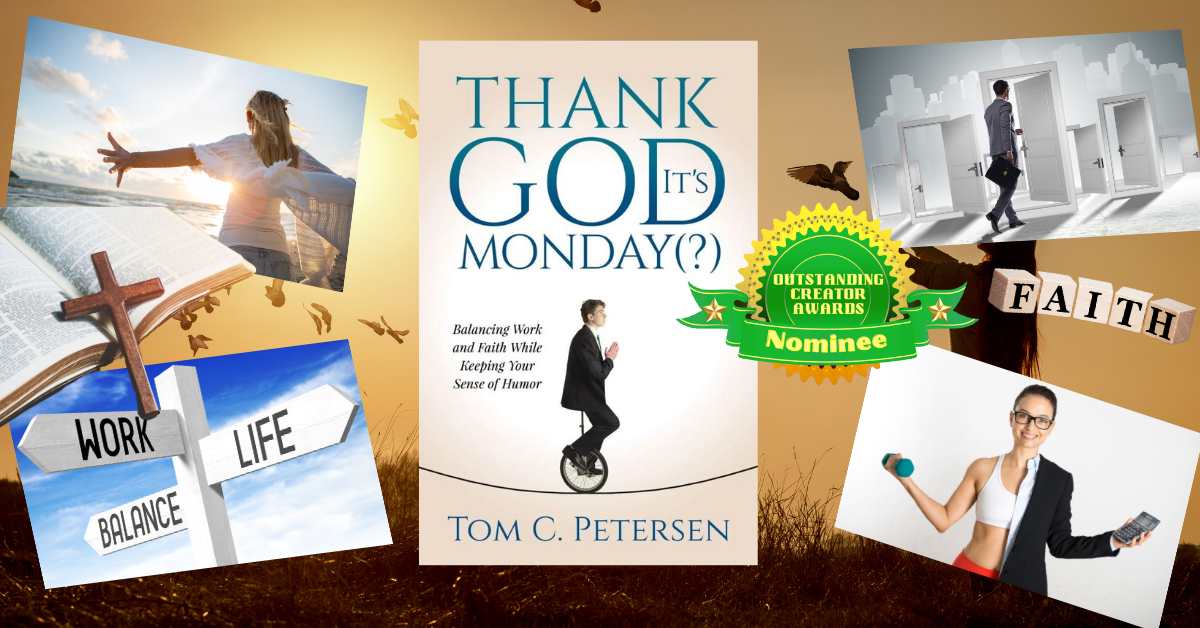|
Score: 94+/100 (9.4+ out of 10)
Thank God It's Monday(?) is a humorous, lighthearted, and enlightening Christian self-help book by Tom Petersen! It also has a distinct lean toward the business genre, making it an interesting look at business from the perspective of a devout Christian. You'd think those two things would be incompatible. The Bible has many verses about the struggles of rich and wealthy people to gain salvation. Many interpret Matthew 6:24 (“No one can serve two masters; for either he will hate the one and love the other, or else he will be loyal to the one and despise the other. You cannot serve God and Mammon”) as meaning that you can't serve both God and money. Some people go so far as to say that money is the root of all evil. Is it though? Mammon isn't necessarily money. Mammon could be an evil entity—a demon or a god of another religion. Mammon could simply represent a “master” other than God, and human beings have made all sorts of those: the Golden Calf of Genesis, idols, celebrities, fame, and fortune. Tax collectors and merchants are often viewed with some disdain in The Bible. There is even a verse in which Jesus says that it's harder for a rich man to enter the kingdom of heaven than it is for a camel to enter the eye of a needle. Yet, the reality is that even the Israelites—God's elect—ran businesses, had a currency, collected taxes, and had an economy. Some of the disciples/apostles ran businesses and at least one was a tax collector. So, money can't be intrinsically evil. In fact, money is necessary in a lot of scenarios. It helps us to provide for ourselves and our loved ones. When a loved one is hurt or injured, it's money that allows us to afford their care. Heck, think about Jesus' story about the Good Samaritan (as discussed in this book). Didn't he offer the inn-keeper money to take care of the robbed and beaten man? Furthermore, God clearly encourages us to work and to commit ourselves to labor. Jesus' own step-dad, Joseph, had a trade. He was a carpenter (some would say a stone mason). Ephesian 4:28 tells us that we should work and made our hands useful to provide for those in need. 1 Timothy 5:8 tells us that we should provide for our households. You could even go all the back to the beginning of Genesis when Creation itself is viewed as work or labor by God himself, so much so that he rests from the work on the seventh day. Adam was also placed in the Garden of Eden to care for (work in it). So, working to obtain something, whether it be money or food, is not intrinsically evil either. In fact, it's necessary in most scenarios. So, this is a book about working, being a businessman, and being a part of the economy while also being a devout Christian and member of the church. Those things don't have to be incompatible or mutually exclusive. You can run on one day and you can lift weights on another. It doesn't make you a bad runner or a bad lifter, it makes you well-rounded and balanced. Remember, Jesus could return tomorrow, but we still have to work and provide for our families as if he may come ten or a hundred years from now. You can still exercise your Christian values and virtues in your every day life, including at work. For example, work can be the proving ground for Jesus' command to love our neighbors and to be good to others, even those who aren't good to us. For example, Peterson talks about the “hard-to-adores” at work. You know the ones. These are the gossipers, the complainers—the people we just can't stand at work. Well, Peterson challenges us (as Jesus would) to be good to them anyway. One of the ways you can do this is by finding common ground. Maybe we both like the same things or have the same interests. One of us was a teacher with a very problematic student who probably hated the teacher. However, the teacher was able to find out that the student loved a particular sport and athlete, so they were able to talk about it with them and find common ground. Now, we have to say: this book is hilarious. In fact, that's probably the best and most enjoyable thing about this book. The author is incredibly clever, coy, snarky, and sarcastic. He has a terrific sense of humor! One of the funniest things about this book is that Tom Peterson doesn't seem to be a very naturally-social or naturally-sociable person. In fact, you can even make the argument that he comes across as antisocial and even self-centered in this book. However, that's kinda the point. Human beings are not perfect. We're not always Christ-like. Yes, that's even true for Christians. In fact, believing you are perfectly Christ-like is a level of ignorance, arrogance, pride, and self-righteousness that actually goes against Christ. You need Jesus. You aren't just instantly-perfect by your own doing. All have sinned and fall short of the glory of God. The author acknowledges that he has “ECE” (“Excessively Covetous Eyesight) which is essentially a level of greed, jealousy, and envy that practically all human beings have. We all want things we can't have (or don't have). However, that's when our faith slaps us on the wrist and reminds us of what God has already blessed us with. Some of our favorite (and often funny) lines from this book are: “If you want to look good, stand next to someone ugly.” “Loyalty programs aren't loyal.” There's also a really humorous part where Peterson describes—perhaps playfully and fictitiously—how he secludes himself at work and during Zoom meetings. It's gold! Check it out on Amazon!
0 Comments
Leave a Reply. |
Archives
July 2024
Categories |

 RSS Feed
RSS Feed